“Mathematicians have tried in vain to this day to discover some order in the sequence of prime numbers, and we have reason to believe that it is a mystery into which the human mind will never penetrate.”-Leonhard Euler
“Madam, I have just come from a country where people are hanged if they talk.”-Leonhard Euler
“Logic is the foundation of the certainty of all the knowledge we acquire.” -Leonhard Euler
“Nothing takes place in the world whose meaning is not that of some maximum or minimum.”-Leonhard Euler
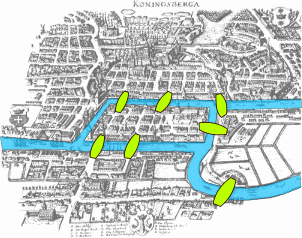 A map lay outing the bridges of Königsberg. This is one of the most famous problems Euler solved known as the Seven Bridges of Königsberg problem. https://en.wikipedia.org/wiki/Seven_Bridges_of_Königsberg‘“A hero is someone who rises above his or her… limitations to achieve something extraordinary…’” (Fingeroth 14). Danny Fingeroth's article “Review of Superman on the Couch: What Superheroes Really Tell Us about Ourselves and Our Society,” argues that heroes surpass their limits to accomplish great feats. It is observable that heroes are those who serve as role models because they go beyond expectations to advance the world through their contributions. However, not anyone can be a hero. Every single human tries to be a hero by demonstrating heroism through small acts from time to time, but what separates them from heroes is one simple trait: innovation. A hero approaches the world from a different perspective. They have the unwavering determination to always pursue their dreams and goals, despite any challenges they face, and to do it in their own unique way. A hero’s passion is the gas that fuels their motor of determination. They act out of love for their field like a mother cradling her newborn baby. Heroes revolutionize their respective fields through their unique perspective. They are the innovators that advance the world, yet still, retain their modesty through it all. Through all of their achievements, they remain modest and only look forward to the next great thing. A hero is an innovator who changes the world, fueled by their passion, through their unwavering determination to achieve their dreams, yet still, retain their modest nature.
A map lay outing the bridges of Königsberg. This is one of the most famous problems Euler solved known as the Seven Bridges of Königsberg problem. https://en.wikipedia.org/wiki/Seven_Bridges_of_Königsberg‘“A hero is someone who rises above his or her… limitations to achieve something extraordinary…’” (Fingeroth 14). Danny Fingeroth's article “Review of Superman on the Couch: What Superheroes Really Tell Us about Ourselves and Our Society,” argues that heroes surpass their limits to accomplish great feats. It is observable that heroes are those who serve as role models because they go beyond expectations to advance the world through their contributions. However, not anyone can be a hero. Every single human tries to be a hero by demonstrating heroism through small acts from time to time, but what separates them from heroes is one simple trait: innovation. A hero approaches the world from a different perspective. They have the unwavering determination to always pursue their dreams and goals, despite any challenges they face, and to do it in their own unique way. A hero’s passion is the gas that fuels their motor of determination. They act out of love for their field like a mother cradling her newborn baby. Heroes revolutionize their respective fields through their unique perspective. They are the innovators that advance the world, yet still, retain their modesty through it all. Through all of their achievements, they remain modest and only look forward to the next great thing. A hero is an innovator who changes the world, fueled by their passion, through their unwavering determination to achieve their dreams, yet still, retain their modest nature.
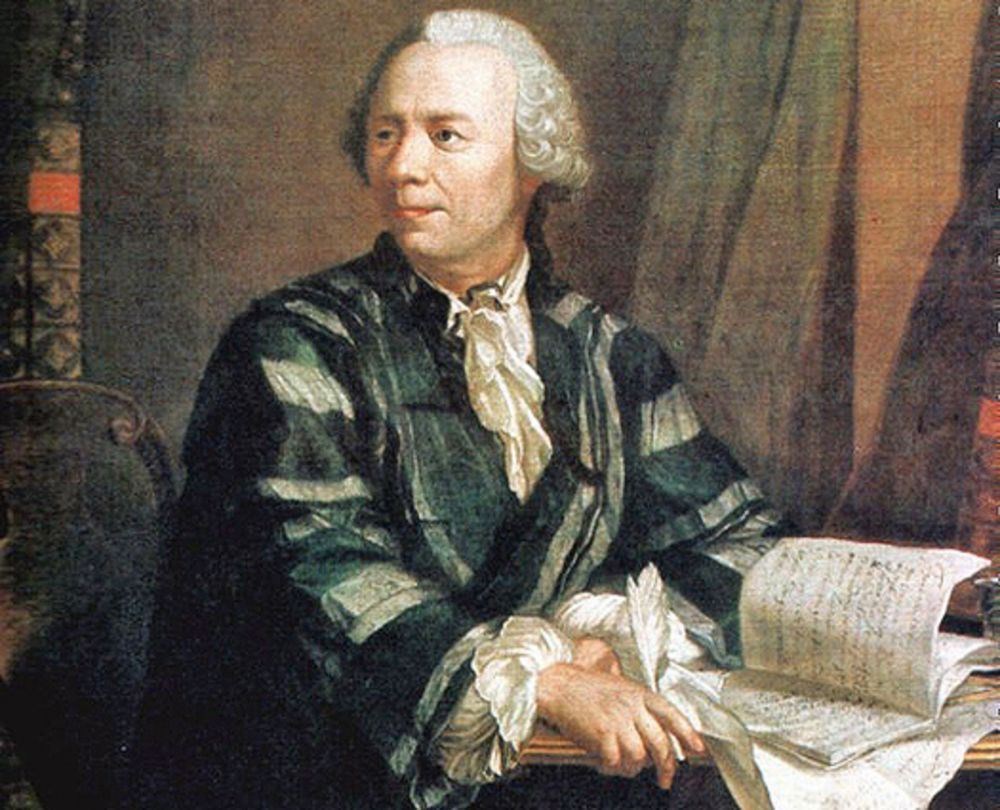 Leonhard Euler working in his study on a research paper for mathematicshttps://commons.wikimedia.org/wiki/File:Leonhard_Euler_2.jpgThere is no other man who exemplifies the essence of an innovator better than this humble mathematician. Numbers are swirling. Papers are flying. The man ponders with an intense focus on his work. He is pursuing the greatest achievements known to man; the beginning of the revolutionizing of the world of mathematics. This man’s name would go down as one of the greatest mathematicians of all time. His name is Leonhard Euler. Leonhard Euler lived during the 18th century in Sweden and Russia. Euler came from humble origins, initially living in a small two-room house. When Euler was 14, his father hired a math tutor for him. His father, Paul Euler, deemed that the school’s teaching was insufficient. Incidentally, Euler fell in love with the subject immediately and began pursuing an education in the realm of mathematics. It was thanks to his father that Euler developed a passion for learning. Euler not only contributed to multiple mathematical fields, but also made gigantic leaps in areas such as physics, engineering, and music theory. Some of his most famous works involve complex analysis, the gamma function, infinitude of primes, the proof of Newton’s identities, the development of topology, and calculating infinite sums. Tragedy did not escape Euler as he lost his eyesight rendering him blind for the rest of his life, dependent on others and trapped to the confines of his mind. The accident rendered him blind for the last twenty-five years of life but it did not stop him in his mathematical work. It only served as a small obstacle he had to maneuver around, as by this time he was a well-distinguished mathematician. Euler’s determination, thanks to his passion for mathematics, allowed him to triumph over this challenge. All of Euler’s contemporaries held him in high regards. They described him as a modest and kind man who had a passion for mathematics like no other. Although a hero is an innovator, they must also possess the traits of determination and modesty to innovate the world. Determination is defined as never giving up on anything despite any challenges because of one’s passion for a field they love; modesty is to not brag and seek fame for one’s accomplishments, but instead seek out ways to accomplish even more. Euler possesses both of these as displayed by his work ethic, accomplishments, and peers. Through Euler’s multiple contributions and actions in the field of mathematics, he cements himself as an innovator, and thus a hero, because of his determination to continue working despite substantial adversities, and his modest nature distinguished by his contemporaries.
Leonhard Euler working in his study on a research paper for mathematicshttps://commons.wikimedia.org/wiki/File:Leonhard_Euler_2.jpgThere is no other man who exemplifies the essence of an innovator better than this humble mathematician. Numbers are swirling. Papers are flying. The man ponders with an intense focus on his work. He is pursuing the greatest achievements known to man; the beginning of the revolutionizing of the world of mathematics. This man’s name would go down as one of the greatest mathematicians of all time. His name is Leonhard Euler. Leonhard Euler lived during the 18th century in Sweden and Russia. Euler came from humble origins, initially living in a small two-room house. When Euler was 14, his father hired a math tutor for him. His father, Paul Euler, deemed that the school’s teaching was insufficient. Incidentally, Euler fell in love with the subject immediately and began pursuing an education in the realm of mathematics. It was thanks to his father that Euler developed a passion for learning. Euler not only contributed to multiple mathematical fields, but also made gigantic leaps in areas such as physics, engineering, and music theory. Some of his most famous works involve complex analysis, the gamma function, infinitude of primes, the proof of Newton’s identities, the development of topology, and calculating infinite sums. Tragedy did not escape Euler as he lost his eyesight rendering him blind for the rest of his life, dependent on others and trapped to the confines of his mind. The accident rendered him blind for the last twenty-five years of life but it did not stop him in his mathematical work. It only served as a small obstacle he had to maneuver around, as by this time he was a well-distinguished mathematician. Euler’s determination, thanks to his passion for mathematics, allowed him to triumph over this challenge. All of Euler’s contemporaries held him in high regards. They described him as a modest and kind man who had a passion for mathematics like no other. Although a hero is an innovator, they must also possess the traits of determination and modesty to innovate the world. Determination is defined as never giving up on anything despite any challenges because of one’s passion for a field they love; modesty is to not brag and seek fame for one’s accomplishments, but instead seek out ways to accomplish even more. Euler possesses both of these as displayed by his work ethic, accomplishments, and peers. Through Euler’s multiple contributions and actions in the field of mathematics, he cements himself as an innovator, and thus a hero, because of his determination to continue working despite substantial adversities, and his modest nature distinguished by his contemporaries.
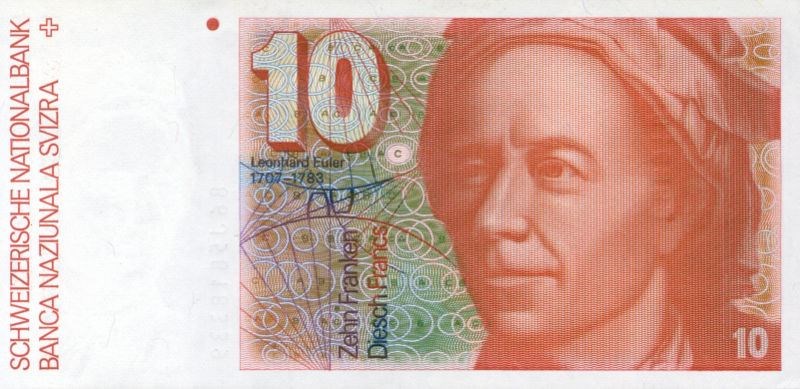 Leonhard Euler is on the official ten Franc note from Switzerland. https://eulerarchive.maa.org/portraits/portraits.htmlEuler’s determination for his work, fueled by his passion as philomath, allows him to overcome substantial adversities, enabling him to be an innovator, the trait needed to be a hero. Andr’e Weil’s statement about Euler’s work ethic demonstrates Euler's passion: “...on the contrary, [Euler] he returns to it, relentlessly, in order to deepen and broaden it on each revisit. Even if all problems related to such a topic seem to be solved, he never ceases until the end of his life to find proofs that are ‘more natural’, ‘simpler’, ‘more direct’” (Gautschi). Weil states that Euler always tries to improve his understanding of a subject by making it simpler and simpler. Through this, Euler exhibits his passion as a philomath, his love of learning. The word “relentlessly” and “returns” illustrate this point. He does his work on mathematics because he feels that he still has more to learn and wants to comprehend complex ideas and topics, despite how daunting the task seemed. In addition, Euler continues to be an innovator because of his determination fueled by his passion. He comes up with new ideas and papers through his love of the subject which in turn makes him adamant about ever stopping to work, his determination.
Leonhard Euler is on the official ten Franc note from Switzerland. https://eulerarchive.maa.org/portraits/portraits.htmlEuler’s determination for his work, fueled by his passion as philomath, allows him to overcome substantial adversities, enabling him to be an innovator, the trait needed to be a hero. Andr’e Weil’s statement about Euler’s work ethic demonstrates Euler's passion: “...on the contrary, [Euler] he returns to it, relentlessly, in order to deepen and broaden it on each revisit. Even if all problems related to such a topic seem to be solved, he never ceases until the end of his life to find proofs that are ‘more natural’, ‘simpler’, ‘more direct’” (Gautschi). Weil states that Euler always tries to improve his understanding of a subject by making it simpler and simpler. Through this, Euler exhibits his passion as a philomath, his love of learning. The word “relentlessly” and “returns” illustrate this point. He does his work on mathematics because he feels that he still has more to learn and wants to comprehend complex ideas and topics, despite how daunting the task seemed. In addition, Euler continues to be an innovator because of his determination fueled by his passion. He comes up with new ideas and papers through his love of the subject which in turn makes him adamant about ever stopping to work, his determination.
Despite all of his accomplishments, Euler still faced great challenges like losing his eyesight: “Despite this tragedy, his productivity continued undiminished, sustained by an uncommon memory and a remarkable facility in mental computations” (Boyer). Even though Euler lost his eyesight, he continued to work as hard as he had before. The diction of “continued” and “diminished” demonstrate a strong willpower to keep on surviving and accomplishing despite the tragedy Euler experienced. Euler embodies the meaning of determination in this moment by reminding himself of why he works so hard for all of these years. He toils for so long because of his love for learning and he wasn’t planning to give up that easily. Through this, Euler exhibits determination because he sticks with the challenge of being blind and finds a way to get around it. Euler not only had opposition from his rivals and critics, but also had opposition from his family as well on his career in mathematics: “A year later he received his master’s degree in philosophy and joined the university’s department of theology, according to his father’s wishes. This compromise did not last long. Euler knew that he loved mathematics too much to simply put it aside and become a minister” (Bruno). The phrase “loved mathematics” exhibits Euler’s determination because he decided to prove to his father that he can pursue a career in mathematics. Euler started publishing mathematical papers in his field. He spoke with his actions by proving to his father that he was good at what he did. Euler’s father had no choice but to accept defeat as no parent should get in the way of what their child has a talent for. This demonstrates Euler’s determination as he decided that he would fight for the objective he wanted to accomplish, to become a mathematician. He did not let his father deter him from the thing he loved. He instead decided that he would work hard for what he loved. Euler, the catalyst for the revolution of mathematics, delineates that he possesses determination by fighting for what he loves through his work and efforts to be a mathematician; this is not the only heroic trait Euler possesses as also being a man of incredible modesty.
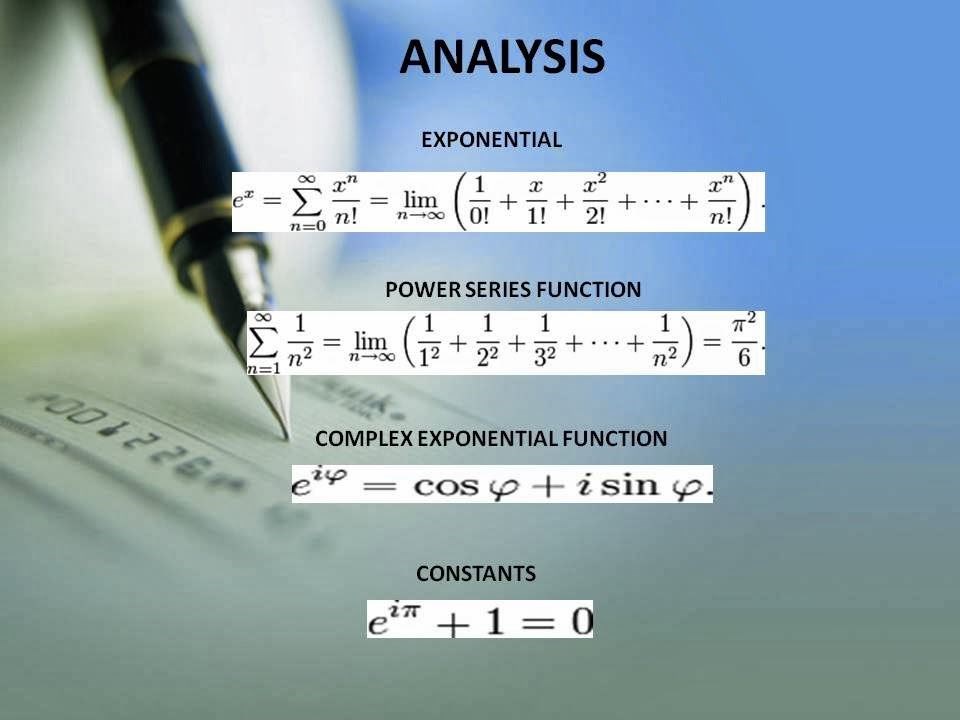 A few examples of Euler’s mathematical work. This all was mainly in the field of Real Analysishttps://thiyagusurimathematicians.blogspot.com/2012/07/module-7-leonhard-paul-euler-1707-1783.htmlEuler’s actions and contemporaries exhibit that although he had achieved much in his career, he was still a man of modesty. In a letter to a friend, Euler talked about an argument over who discovered a theorem first: “When a dispute arose over precedence in what is now known as the Euler-Maclaurin Method for computing infinite sums, Euler wrote to a friend, ‘I have very little desire for anything to be detracted from the fame of the celebrated Mr. Maclaurin since he probably came upon the same theorem for summing series before me, and… deserves to be named as its first discoverer” (Derbyshire). Euler displays that he is a man of modesty through the phrase of ‘I have very little desire’. He doesn’t care if he isn’t the one credited with the theorem. He does not think much of his accomplishments but instead looks to the next one. He respects his peers and believes that his work is inferior when in reality he achieved so much more. Additionally, one of Euler’s contemporaries, Fuss, delineated Euler’s character in a letter: “Euler comes across as a modest, inconspicuous, uncomplicated, yet cheerful and sociable person”(Gautschi). Fuss declares that Euler is a man who is modest. Although Euler achieved great success and fame in the math world, Fuss notes that Euler does not try to attract attention. He’s a modest man who wants to live a quiet life. The trait of modesty is significant to the career of a mathematician. Being modest allows mathematicians to confer with one another on their work without having their pride get in the way. Many mathematicians did not possess this trait, but Euler did making him a likable and easy to work with man. It can be concluded that Euler decides to do what he loves instead of trying to obtain fame making him a man of modesty.
A few examples of Euler’s mathematical work. This all was mainly in the field of Real Analysishttps://thiyagusurimathematicians.blogspot.com/2012/07/module-7-leonhard-paul-euler-1707-1783.htmlEuler’s actions and contemporaries exhibit that although he had achieved much in his career, he was still a man of modesty. In a letter to a friend, Euler talked about an argument over who discovered a theorem first: “When a dispute arose over precedence in what is now known as the Euler-Maclaurin Method for computing infinite sums, Euler wrote to a friend, ‘I have very little desire for anything to be detracted from the fame of the celebrated Mr. Maclaurin since he probably came upon the same theorem for summing series before me, and… deserves to be named as its first discoverer” (Derbyshire). Euler displays that he is a man of modesty through the phrase of ‘I have very little desire’. He doesn’t care if he isn’t the one credited with the theorem. He does not think much of his accomplishments but instead looks to the next one. He respects his peers and believes that his work is inferior when in reality he achieved so much more. Additionally, one of Euler’s contemporaries, Fuss, delineated Euler’s character in a letter: “Euler comes across as a modest, inconspicuous, uncomplicated, yet cheerful and sociable person”(Gautschi). Fuss declares that Euler is a man who is modest. Although Euler achieved great success and fame in the math world, Fuss notes that Euler does not try to attract attention. He’s a modest man who wants to live a quiet life. The trait of modesty is significant to the career of a mathematician. Being modest allows mathematicians to confer with one another on their work without having their pride get in the way. Many mathematicians did not possess this trait, but Euler did making him a likable and easy to work with man. It can be concluded that Euler decides to do what he loves instead of trying to obtain fame making him a man of modesty.
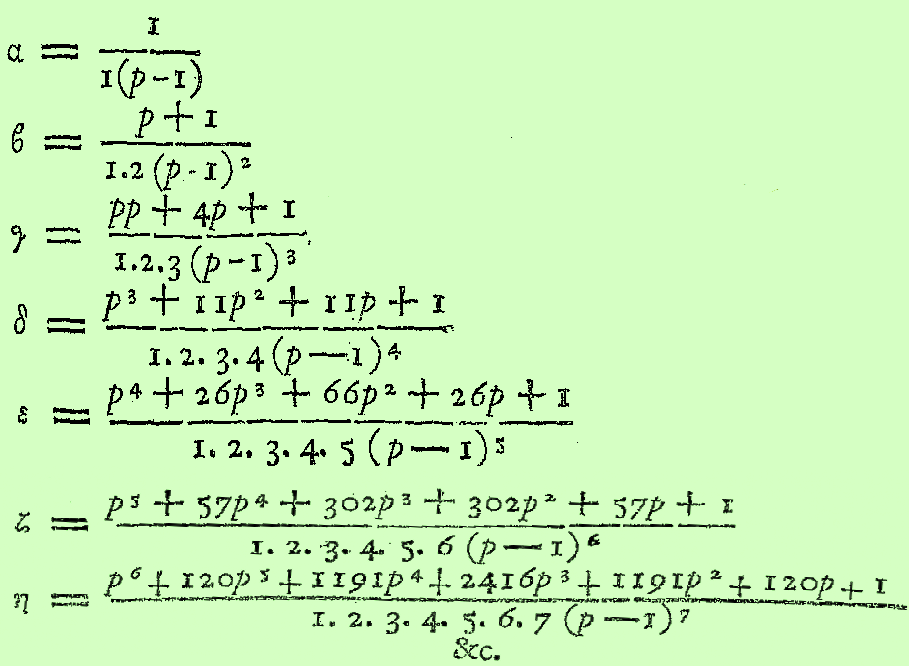 An example of Euler’s mathematical work. This is known as Eulerian polynomials https://www.luschny.de/math/euler/EulerianPolynomials.htmlEuler establishes himself as the catalyst for the revolution of mathematics because of his love of learning fueling his determination and his humility delineated by his peers despite all of his achievements. Euler had to face many adversities throughout his life. Obtaining the approval of his father, dealing with being blind, and struggling in his childhood are just a few of the challenges he had to face. It was thanks to his passion as a philomath that he was able to have the determination to overcome these adversities. Additionally, Euler did not look for fame or fortune although he could have easily obtained it through his work. He was a man who had humble beginnings, a quiet life, and humility. Euler serves as an inspiration to others by demonstrating that the first step to becoming a hero is to love what you do: “No one wrote and published more mathematics than Leonhard Euler. At the time of his death, he reportedly left enough papers behind to keep the printing presses busy for another thirty-five years” (Bruno). Euler worked hard for what he wanted and overcame numerous challenges to innovate mathematics. He saw something that he loved and he persevered toward it. He also reminds people through his actions to never forget your humble beginnings, inspiring others to look forward to the next great thing instead of clinging to the glory of the past. Euler changes the world through his innovation.
An example of Euler’s mathematical work. This is known as Eulerian polynomials https://www.luschny.de/math/euler/EulerianPolynomials.htmlEuler establishes himself as the catalyst for the revolution of mathematics because of his love of learning fueling his determination and his humility delineated by his peers despite all of his achievements. Euler had to face many adversities throughout his life. Obtaining the approval of his father, dealing with being blind, and struggling in his childhood are just a few of the challenges he had to face. It was thanks to his passion as a philomath that he was able to have the determination to overcome these adversities. Additionally, Euler did not look for fame or fortune although he could have easily obtained it through his work. He was a man who had humble beginnings, a quiet life, and humility. Euler serves as an inspiration to others by demonstrating that the first step to becoming a hero is to love what you do: “No one wrote and published more mathematics than Leonhard Euler. At the time of his death, he reportedly left enough papers behind to keep the printing presses busy for another thirty-five years” (Bruno). Euler worked hard for what he wanted and overcame numerous challenges to innovate mathematics. He saw something that he loved and he persevered toward it. He also reminds people through his actions to never forget your humble beginnings, inspiring others to look forward to the next great thing instead of clinging to the glory of the past. Euler changes the world through his innovation.
To sum it all up, he inspires others to pursue their dreams, no matter the adversities. Personally, Euler inspires me by renewing my energy to persevere. When I reach my breaking point, Euler serves as motivation for me to continue. He makes me feel that I’m important, that I can achieve something. If a poor boy from a small hamlet can rise up to be the greatest mathematician of all time, then it makes me feel that I can do so as well. Euler’s life story and his determination inspires me to chase my dreams, even if I may not be the smartest, the bravest, or the kindest. Despite his achievements, he still doesn’t brag about his achievements. I strive to be a hero like him. I admire him. I can’t understand how a man can achieve an endless number of accomplishments and suffer so much yet think little of what he has done. I want to become better as a person because of Euler. I am fledgling compared to him right now, but it’s his actions that inspire me. Whenever I am at my breaking point I remind myself that if Euler can stand to seem like a giant, then I can become the giant Euler was; a modest and determined man. Heroes break their limitations and through this, they revolutionize the world and create a chain reaction; a chain reaction of potential heroes following in their footsteps. Although Euler may be long gone from the Earth, he remains remembered as the most influential mathematician in history. Not everybody can be a great hero, but a great hero can come from anywhere.
Works Cited
Boyer, Carl B. “Leonhard Euler.” Encyclopædia Britannica, Encyclopædia Britannica, Inc., 17 Nov. Nov. 2017, www.britannica.com/biography/Leonhard-Euler.
Derbyshire, John. "Euler's constancy: Leonhard Euler is seldom remembered as one of the Enlightenment greats, but he should be. His discoveries changed the course of mathematics forever, and 300 years after his birth his ideas continue to resonate in classrooms and laboratories." The Wilson Quarterly, vol. 31, no. 2, 2007, p. 30+. Biography in Context, https://link.galegroup.com/apps/doc/A163065667/BIC1?u=powa9245&xid=dff7af31. Accessed 21 Dec. 2017.
Euler, Leonhard. "Of Light, and the Systems of Descartes and Newton." Letter to Anhalt-Dessau. 7 June 1760. https://homepages.wmich.edu/~mcgrew/euler.htm. N.p., n.d. Web. 4 Jan. 2017.
Fingeroth, Danny. ““Review of Superman on the Couch: What Superheroes Really Tell Us about Ourselves and Our Society.”
Gautschi, Walter. “Leonhard Euler: His Life, the Man, and His Works.” Purdue OWL, 1 Feb. 2008, www.cs.purdue.edu/homes/wxg/EulerLect.pdf.
"Leonhard Euler." Math & Mathematicians: The History of Math Discoveries Around the World, edited by Leonard C. Bruno, UXL, 2008. Biography in Context, https://link.galegroup.com/apps/doc/K1669000016/BIC1?u=powa9245&xid=9a2e2de1. Accessed 21 Dec. 2017.
Page created on 2/28/2018 3:44:40 AM
Last edited 9/14/2018 9:07:02 PM

Fox Davenport is an Honors English student at Del Norte High School. His main hobbies and passions are chemistry, mathematics, trivia, and chess. Mathematics is his favorite subject and he hopes to pursue a math degree in the future. Leonhard Euler was a no-brainer pick for him as he has always admired Euler's mathematical achievements. Fox hopes that through this essay that future generations will be inspired to love math and science.